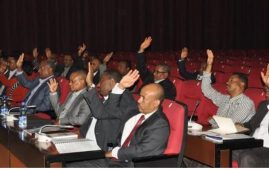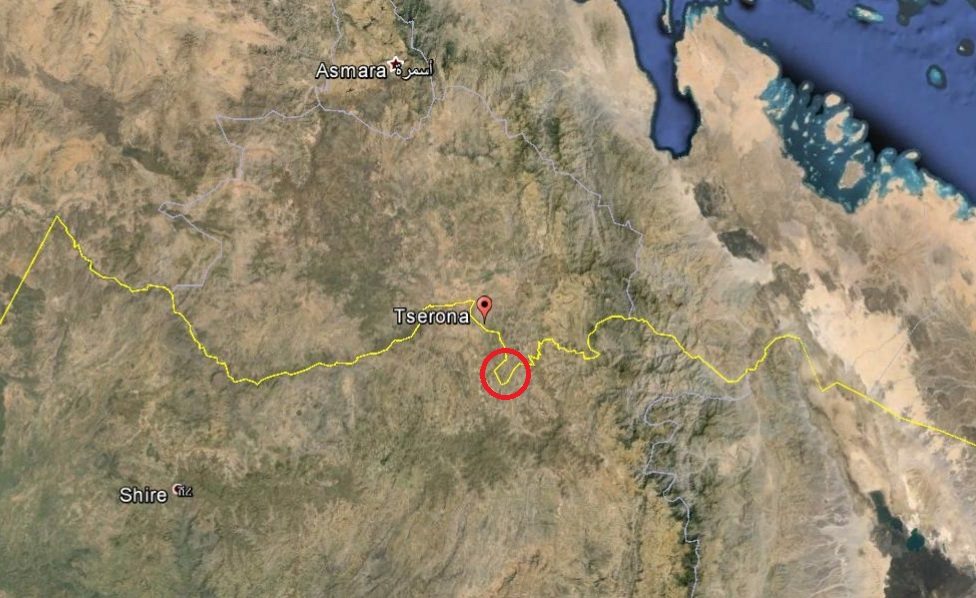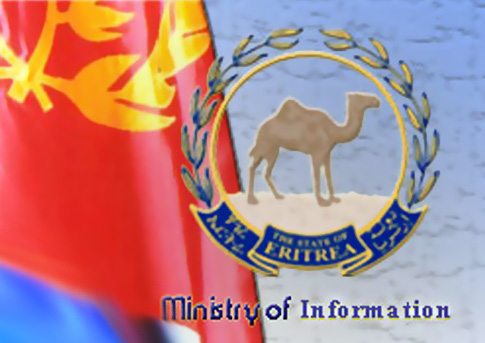Leaked Cables of US Embassy Asmara reveals the Eritrean government’s multi-faceted economic repression and exploitation on its own people.
One Cable states that ‘in a good year Eritrea can produce only 80% of its food needs, yet the Isaias regime spurns food aid.’
‘Spurning food aid’ might not have been a bad thing if only President Isaias Afeworki let the people keep the fruits of their labor and finds a way to import the shortfall. After all, importing food is the major excuse the regime uses to collect money from Eritreans living abroad through various schemes – a 2% tax, year-round fund raisings, etc – employing various pressures which some equate with extortion. This is in addition to the money they regularly send to their families and relatives, which is heavily taxed if done via formal banks.
But the extortion is plain and brutal on the Eritreans at home, as the Cable dated August 2008 reports.
Last year the government provided tractors (driven by National Service conscripts) to plow, plant, and harvest fields if requested by farmers. This service was offered on credit against a share of the final harvest. Many farm families were reportedly shocked to learn that 80% of their crop was required to pay off this "tractor debt" to the government.
The extortion got even more blunt the subsequent year
Unlike last year, the government is not asking if the farmers want to "hire" the government’s tractor services; the government is ordering National Service conscripts to plow and plant substantial amounts of farmland without regard to the farmers’ wishes. The NGO director fears this may result in the regime taking the entire crop from the government-planted fields, leaving farm families with little more than garden produce and foraging goats on which to survive.
Of course, not everything reported by a US Embassy Cable or an NGO is necessarily accurate, even if the latter is ‘a major NGO dealing with the agricultural sector’ of Eritrea. But how much of their produce could the farmers be actually giving up to pay off the ‘tractor debt’? 70%? 50%? Surely, productivity didn’t increase by 100% or 200%, as shown by the food crisis in the year after the Cable.
In fact, food security got worse the next year. As the February 2009 Cable reports, citing UN FAO report:
Eritrea is currently producing 30% of its food needs. In previous years the country has produced 60% of its food needs.
Apparently, the Asmaran strongman spurns not only food aid but also trade. The Oct. 2009 Cable sheds light into the reason behind the widely reported state monopoly of grain trade in Eritrea. The Cable notes:
According to one candid GSE official, the government control of grain stems from an unwritten policy created during the country’s early years when President Isaias first developed his aversion to foreign aid and belief it was a threat to state power. To counter this perceived threat, Isaias ordered the government to take charge of the selling and distribution of grain.
…..the GSE is now restricting movement of food between cities. Checkpoints now involve agricultural inspections to ensure that food is not being transported between cities without GSE approval. Farmers also report having entire crops taken by GSE authorities with little or no compensation in return. In most instances the farmers are given an "IOU" from the GSE.
[IOU – a written record of debt. GSE – Government of the State of Eritrea.]
Mind you, the tractor drivers are National Service conscripts. The National Service is mandatory program where every Eritrean had to join a year before completing Secondary School. Though launched as a two year long military training and volunteer labor service, it turned into an indefinite service with no end insight. Business firms owned by the ruling party,PFDJ, benefit the ‘volunteer labor’, with little or no payments of wage in return, according to reports from the International Crisis Group(ICG) and others.
An October 2009 Cable describes the National Service as follows:
Hundreds of thousands of Eritrea’s citizens are conscripted to national service where many are forced to serve until age 54 (men) and age 47 (women) at wages under $30/month. Mandatory national service begins as early as age 17 for both boys and girls, when they are required to leave home to attend their 4th year of high school at "Sawa," a camp that includes intensive military training. Some conscripts have performed back-breaking hard labor since 1994 when national service began. The ministry of defense periodically conducts round-ups of any persons who cannot show evidence of their demobilization from national service. Round-ups may occur any time of day or night throughout the year, but become more frequent immediately before Eritrea’s May 24th Independence Day holiday.
Read below the full text of the two Cables titled:
-
Squeezing Eritrean Farmers To Feed The Troops [Aug 2008]
-
GSE Revives Its Grain Regulation Policies [Feb 2009]
[Note: The gratuitous remark in the first Cable that ‘most Eritreans are skinny’ is probably because the writer is used to obesity in his country.]
****************************
Reference ID – 08ASMARA402
Created – 2008-08-13 12:59
Released – 2011-08-26 00:00
Classification – UNCLASSIFIED//FOR OFFICIAL USE ONLY
Origin – Embassy Asmara
VZCZCXRO9532
RR RUEHROV
DE RUEHAE #0402 2261259
ZNR UUUUU ZZH
R 131259Z AUG 08
FM AMEMBASSY ASMARA
TO RUEHC/SECSTATE WASHDC 9840
INFO RUCNIAD/IGAD COLLECTIVE
RUEKDIA/DIA WASHDC
RUEAIIA/CIA WASHDC
RHEHNSC/NSC WASHDC
RUEKJCS/SECDEF WASHDC
RHMFISS/CDR USCENTCOM MACDILL AFB FL
RUMICEA/JICCENT MACDILL AFB FL
RUEPADJ/CJTF-HOA J2X CAMP LEMONIER DJ
RHMFISS/HQ USAFRICOM STUTTGART GE
RHRMDAB/COMUSNAVCENT
UNCLAS ASMARA 000402
SENSITIVE
SIPDIS
DEPARTMENT FOR AF/E
LONDON AND PARIS FOR AFRICA WATCHERS
E.O. 12958: N/A
TAGS: EAGR PGOV EAID ECON MOPS ER
SUBJECT: SQUEEZING ERITREAN FARMERS TO FEED THE TROOPS
¶1. (U) Why Most Eritreans are Skinny
————————————–
Most Eritreans are poor farmers who barely scratch out a living in this dry, rocky country. In a good year Eritrea can produce only 80% of its food needs, yet the Isaias regime spurns food aid. UNICEF reports that 40% of children under age five are malnourished. Farmers in the relatively fertile central and south-central regions depend on 11 or 12 inches of rainfall in the rainy season (July and August) to refill reservoirs, wells, intermittent streams, and ponds needed for irrigation. This rainy season has been disappointing; the rest of August needs to be especially wet to avoid major grain shortfalls in the coming year.
¶2. (SBU) Beware of Government Tractors
—————————————
While the state offically owns almost all land in Eritrea, families and villages can secure extended land-use rights for "their" farms. Most farmers plow the rocky land with oxen-drawn one-bottom wooden plows tipped with iron. Teenagers and young adults from farm families traditionally undertake with this time-consuming task. However, perhaps 100,000 young people are now sitting in trenches facing Ethiopia. Last year the government provided tractors (driven by National Service conscripts) to plow, plant, and harvest fields if requested by farmers. This service was offered on credit against a share of the final harvest. Many farm families were reportedly shocked to learn that 80% of their crop was required to pay off this "tractor debt" to the government.
¶3. (SBU) But We Thought Collectivization Didn’t Work
——————————————— ——–
The director of a major NGO dealing with the agricultural sector reports that the regime has again sent tractors driven by National Service conscripts to plow and plant on "private" farmland in the central and south-central regions. Unlike last year, the government is not asking if the farmers want to "hire" the government’s tractor services; the government is ordering National Service conscripts to plow and plant substantial amounts of farmland without regard to the farmers’ wishes. The NGO director fears this may result in the regime taking the entire crop from the government-planted fields, leaving farm families with little more than garden produce and foraging goats on which to survive.
¶4. (SBU) Priority #1: Food for the Trenches
——————————————-
When asked why the government would do this, as it would clearly jeopardize the well-being of hundreds of thousands of farm families, the director said, "They need to get food to the trenches." He stated that hungry farmers are less an immediate threat to the regime’s survival than hungry soldiers.
MCMULLEN
**************************
Reference ID – 09ASMARA41
Created – 2009-02-03 14:00
Released – 2011-08-26 00:00
Classification – UNCLASSIFIED//FOR OFFICIAL USE ONLY
Origin – Embassy Asmara
VZCZCXYZ0007
RR RUEHWEB
DE RUEHAE #0041 0341400
ZNR UUUUU ZZH
R 031400Z FEB 09
FM AMEMBASSY ASMARA
TO RUEHC/SECSTATE WASHDC 0131
INFO RUCNIAD/IGAD COLLECTIVE
RUEKJCS/SECDEF WASHDC
RHEHNSC/NSC WASHDC
RUEAIIA/CIA WASHDC
RUEKDIA/DIA WASHDC
RUMICEA/JICCENT MACDILL AFB FL
RUEPADJ/CJTF-HOA J2X CAMP LEMONIER DJ
RUZEFAA/HQ USAFRICOM STUTTGART GE
RHRMDAB/COMUSNAVCENT
UNCLAS ASMARA 000041
SENSITIVE
SIPDIS
DEPT FOR AF/E AND NAIROBI FOR GEORGIANNA PLATT FOR USAID
LONDON AND PARIS FOR AFRICA WATCHERS
E.O. 12958: N/A
TAGS: EAGR PGOV SOCI ER
SUBJECT: GSE REVIVES ITS GRAIN REGULATION POLICIES
¶1. (SBU) SUMMARY: In a recent interview, President Isaias mentioned a defunct grain regulation policy that has taken effect once more in Eritrea. The result is a visible tightening on the selling of grain in the marketplace as well as greater government control over the movement of grain between cities. All this takes place amid one of the worst harvests the country has seen in over twenty years. End Summary.
BAN ON SELLING GRAIN
——————–
¶2. (SBU) President Isaias conducted a much-publicized interview with the government-owned website, shabait.com, January 10th where he referred to a prohibition of "selling and exchanging of crops," supposedly in place since the mid-90s. The reference to this statute led to a stir on opposition websites, condemning the President’s "cereal proclamation." Market vendors responded by scaling back the amount of grain on display to just a few kilos. But the concern appears justified: reportedly some shops were closed after government investigators deemed them to be selling "contraband grainstuffs."
¶3. (SBU) According to one candid GSE official, the government control of grain stems from an unwritten policy created during the country’s early years when President Isaias first developed his aversion to foreign aid and belief it was a threat to state power. To counter this perceived threat, Isaias ordered the government to take charge of the selling and distribution of grain. Although this policy seems to have been enforced only sporadically through the years, Isaias’ recent mention of it and the market confiscations has put grain vendors back on alert.
STATE CONTROL OF ALL FOOD
————————-
¶4. (SBU) Simultaneously, the GSE is now restricting movement of food between cities. Checkpoints now involve agricultural inspections to ensure that food is not being transported between cities without GSE approval. Farmers also report having entire crops taken by GSE authorities with little or no compensation in return. In most instances the farmers are given an "IOU" from the GSE.
FOOD PRODUCTION LOW
——————-
¶5. (SBU) According to a recent UNFAO report, Eritrea is currently producing 30% of its food needs. In previous years the country has produced 60% of its food needs, and has supplemented the rest via imports. With restrictions in place on food imports and humanitarian aid in the name of GSE-styled "self-reliance" it will be impossible for the government to meet this 70% food shortfall. The director of one international NGO fears the situation is even worse than the FAO report indicates: "From what I’ve seen in the field the 30% is a large over-estimate." The NGO’s local staff has compared the current food shortage to the well-known droughts of the mid-80s.
MCMULLEN
*****************
Check the Wikileaks Archive and Eritrea Archive for previous and forthcoming posts.






I tend not to leave a great deal of remarks, however i did
some searching and wound up here Eritrean Farmers: Screwed by ‘tractor debt’ [Wikileaks – full text] « Danielberhane’s Blog. And I do have some questions for you if it’s allright. Is it just me or does it look like a few of these remarks look like coming from brain dead people? 😛 And, if you are posting at other online social sites, I’d like to keep up with everything fresh you have to post. Could you make a list of the complete urls of your shared sites like your Facebook page, twitter feed, or linkedin profile?